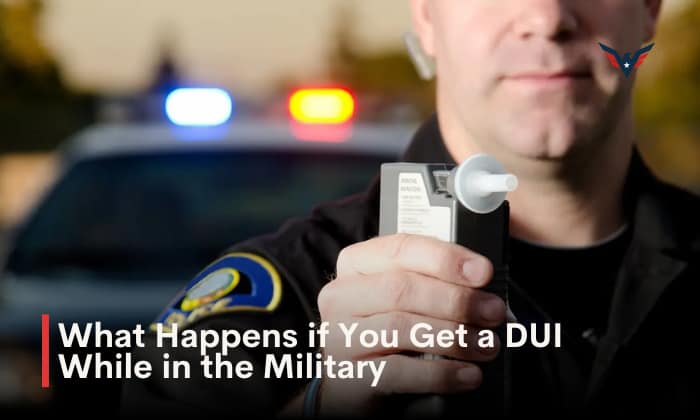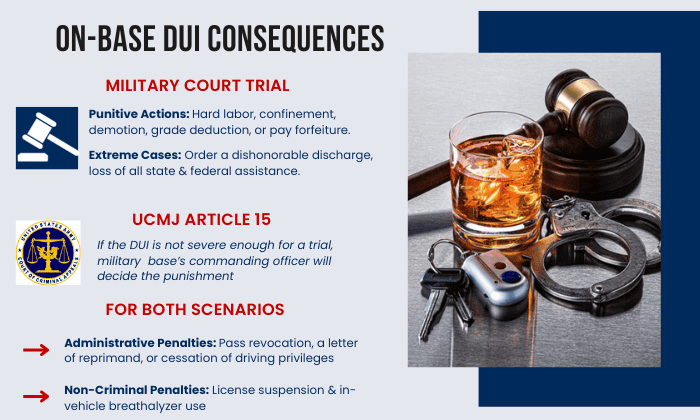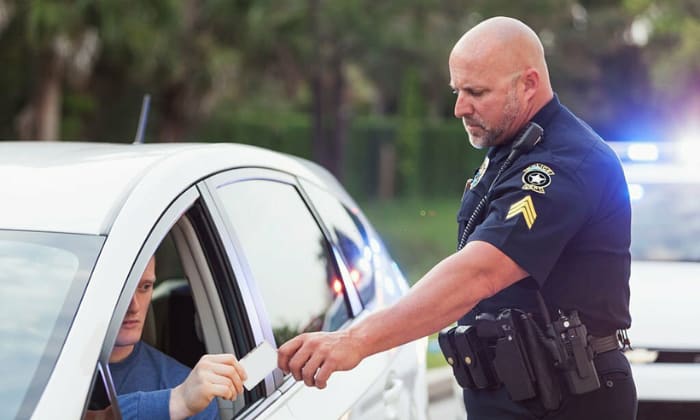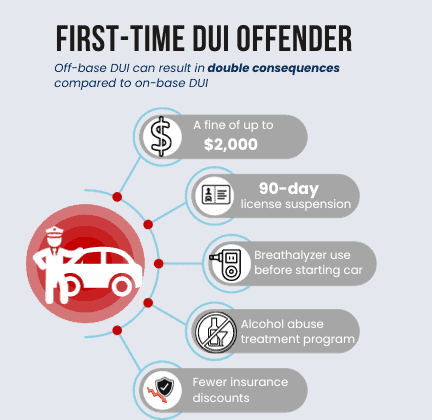While most people know the consequences of DUI for civilians, such as fines, community service, and license suspension, drunk driving consequences for service members may be less known.
Generally speaking, this unlawful act can result in the following:
- A military court trial for on base DUI charges OR a civilian trial for off-base ones. With off-base infringements, the military may also step in and hold a trial of its own, but this is very rare.
- DUI punishment for military members may include: demotion, substance abuse treatment and corrective training, reduced pay, and even severe consequences like dishonorable discharge and prison time.
- Administrative actions can include a letter of reprimand and enlistment prohibition.
Consequences of a DUI in the military
Depending on where the DUI happens, what happens next will vary. Continue reading to find out the specifics regarding what punishment you’ll receive if caught DUI in the military.
1. On-base DUI
If service members get arrested on a military base, they will have to face the following repercussions:
- A military court trial, as dictated by Article 111, Section 911 of the UCMJ (Uniform Code of Military Justice) on drunken or reckless driving
Punitive actions often include hard labor, confinement, demotion, grade deduction, or pay forfeiture. In extreme cases, the court will order a dishonorable discharge of the service member.
Unlike honorable discharge, which qualifies one to receive veteran benefits, dishonorable discharge means you’ll lose all state and federal assistance that would have come from your enlistment.
- Note that when the DUI is not bad enough to require a trial, UCMJ Article 15 will come into play. In this case, the military base’s commanding officer will decide the punishment instead of a court-martial.
- For both scenarios, administrative actions, such as pass revocation, a letter of reprimand, or the ceasing of driving privileges on military installations, may apply.
If the DUI charge involves grave consequences (i.e. injuries, death, or property damage), the administrative actions will be harsher. Service members may also need to undergo treatment for substance abuse.
For offenders who get kicked out of the military, reenlistment can become impossible.
- Lastly, drunk drivers will have to worry about non-criminal penalties, namely, license suspension and in-vehicle breathalyzer use.
2. Off-base DUI
As stated, off-base DUI regulation usually involves a civilian rather than a military trial.
However, even without a military court, offenders can face administrative actions similar to the ones listed for on-base DUI.
In rare cases where the armed force decides to prosecute service members, the charges may be for violations related to the DUI and not just the DUI by itself, though both may apply.
This is why off-base DUI can have double the consequences of on-base DUI.
So, if you need a refresher on the civilian consequences of driving under the influence, here’s a list. Note that punishments will vary among states.
- First-time DUI offender
A fine of up to $2,000; 90-day license suspension (longer for subsequent offenses); license revocation in severe cases; and 1 day to six months in prison (or multiple years in jail for repeat offenders and felons)
- Breathalyzer use before starting the car
- Alcohol abuse treatment program
- Fewer insurance discounts and higher insurance rates
Conclusion
Now, you know what happens if you get a DUI while in the military.
Severe consequences aside, it’s vital to note that military self-reporting DUI is mandatory in the Marines and Navy. However, the nuances regarding when to self-report (e.g. how soon after an arrest must “immediate” reporting be done?) are often unclear to anyone but seasoned lawyers.
For this reason, if you find yourself with a DUI, it’s best to consult a lawyer to understand DUI policy better.

For an ex-serviceman, it is a pleasure for me to continue my work in The Soldiers Project. This site is built with the target to help people who work in security jobs and other people to gear themselves with high-quality equipment. It is essential for many duties that they have the protection required to perform with safety.




